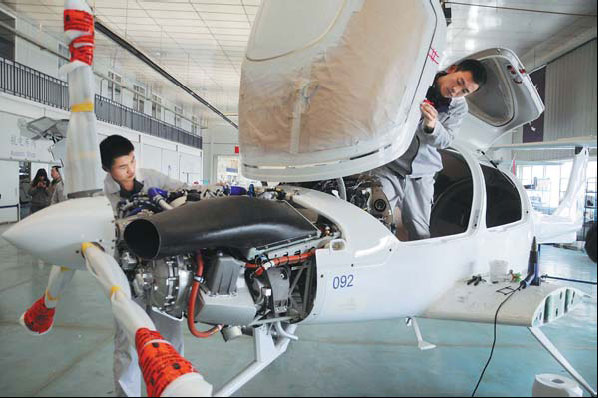China manufacturing likely to slow in April
|
Workers assemble a plane at Shandong Bin Ao Aircraft Industries Co Ltd in Binzhou, Shandong province. The flash HSBC Purchasing Managers' Index for April fell to 50.5 from 51.6 in March, but was still stronger than February's reading of 50.4. Zhang Bin / For China Daily |
New HSBC data cast doubt over recovery in the coming months
April manufacturing output may shrink substantially, contrary to market expectations, casting a shadow over an economic rebound in the coming months, according to HSBC Holdings PLC.
The manufacturing Purchasing Managers' Index is likely to retreat to 50.5 in April from 51.6 a month earlier, indicating modest, rather than strong growth momentum, HSBC data showed on Tuesday.
The PMI has remained above 50 for six consecutive months, which means continuing expansion in the industrial sector. Any reading below 50 suggests contraction.
Factory output may weaken to a two-month low of 51.1 from 53 in March.
The sub-index of new export orders may drop to 48.6, the first time it has fallen below 50 since December, pointing to more headwinds from the overseas market.
Research from Nomura Securities Co Ltd pointed out that a large fall in PMI in April would be unusual. It has risen five times in the past seven years, with one decline and one flat reading.
"On average, it rose by 1.2 percentage points from March to April," said Zhang Zhiwei, Nomura's chief Chinese economist.
Qu Hongbin, chief China economist at HSBC, warned that weakened market demand has started to influence employment in the manufacturing sector, as the indicator dropped to 49.6 in April from 50.1 in March, the first time it fell below 50 in five months.
He said that policymakers are expected to "respond strongly to sustain economic recovery by increasing efforts to boost domestic investment and consumption in the coming months".
Compared with the slower growth in manufacturing, service sector growth accelerated in the first quarter, increasing 8.3 percent year-on-year, 0.8 percentage points higher than that in the same period last year, the National Development and Reform Commission, the country's top economic planning agency, reported on Tuesday.
In the first three months, service industry output value accounted for 47.8 percent of total GDP, up 1.6 percentage points from a year earlier, compared with 45.9 percent in secondary industry, which includes the industrial and construction sectors, the commission said.
Investment in the service sector increased 24.5 percent in the first quarter, 3.6 percentage points faster than in fixed-asset investment, while real estate investment grew 20.2 percent year-on-year, 3.3 percentage points slower than the same period in 2012.
Zhang Yongjun, a senior economist with the China Center for International Economic Exchanges, a government think tank, suggested that the economic rebound trend has not reversed, but instead gotten slower.
"This was due to the new government's desire to slow down growth in return for higher quality economic development," Zhang said.
He said that amid the weak recovery, it would be unwise to tighten monetary policy, although the broad money supply growth rate exceeded expectations from January to March.
Zhang also suggested that the authorities should "moderately adjust the exchange rate" to slow renminbi appreciation.
"More control measures should be taken to fight rapid inflows of speculative money from overseas."
Huang Yiping, chief economist in China at Barclay's Capital, said that the government may remain calm despite the relatively soft economic data in recent months, as Premier Li Keqiang is "focusing on deepening reforms to put growth on more sustainable footing, while central bank governor Zhou Xiaochuan believes that the current growth rate is still within a reasonable range".
Nomura predicted that GDP growth is likely to trend down through the rest of the year, to 7.5 percent in the second quarter, 7.4 percent in the third and 7.2 percent in the final three months.
"The effectiveness of policy easing has been diminished by aggressive stimulus measures taken over the past five years," said Zhang from Nomura.
chenjia1@chinadaily.com.cn



















